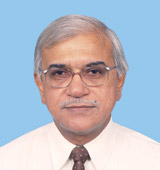|
Executive Interviews: Interview with Jittu Singh on Global Economy and Global Managers
October 2008
-
By Dr. Nagendra V Chowdary
 Dr.Jittu Singh
Dr.Jittu Singh Tata Steel Chair Professor of Organizational Development, XLRI. 
-
As you compare the Fortune 500
companies list, let's say in 1958 and
2008, what distinguishes these two
lists? What can be surmised and
learnt from those two lists? As you
look at companies in USA, Europe,
and Asia, what stands out? Is there
any particular development that seems to sum up the impact of global
competition?
The fact that many of the companies
on the original list of 1958 have
disappeared from its 2008 version
suggests that giants are not invincible.
It is not the biggest who survive but
the most alert and adaptive.
|
|
Unfortunately, this repeated lesson of
history is often lost on those who are
current leaders. They are so drunk on
their own success that they refuse to
pay attention to emerging danger
signals and to chart a different
course from the one that made them
the current leader. The need for continuous reinvention
is heightened today because of
increasing competition from all
directions. Each year, the Fortune list
has been featuring an increasing
number of new entrants from the
emerging economies. The old giants
beware!! -
According to a recent McKinsey
Global Survey, almost 70% of
executives around the world say that
global social, environmental, and
business trends are increasingly
important to corporate strategy. Yet
relatively few companies act on the
global trends they think will affect
them most; among those that
do act, only 17% report significant
benefits. Why is there such a
disparity between need and action?
Yes, as I have already indicated
earlier, management cannot afford to
be insular any more. It must open its
eyes to a wider environment
surrounding it. Itmust detect shifts in
socioeconomic, political, and
competitive trends and change in
appropriate ways as rapidly as
possible; otherwise, it runs the
serious risk of managing in outdated
and obsolete ways. Furthermore,
obtaining public support and
goodwill for what it does is essential
for the survival. -
Competition existed long before
modern economies and businesses
were born. It began with life itself.
Gause's Principle of Competitive
Exclusion illustrated that no two
species can coexist that make their
living in the identical way. What
would be the new frontiers of
competition?Who are likely to be the
major winners in these frontiers?
What would be the new
differentiating (when the competitors
are closing in on the gaps) factors for
companies?
Yes, there has been competition
throughout human history. But what
distinguishes our era is the intensity
and pace of the competition. A firm
does not compete against only a
limited number of local or domestic
competitors; it is now required to take
on the best from around the globe.
Therefore, the field has expanded. To
compound difficulties, both the
general business environment and
competitors seem to throw up new
challenges suddenly and at shorter
intervals. As Toffler said, everybody
is confronted with 'future shock'. -
Do you foresee an increasingly
decreasing role of multilateral
international bodies like, WTO
(with the rise of regional and
bilateral trade agreements and
perennial showdown at recent
meetings, including impasse at Doha
round of talks), UNO (with private
sector assuming a great role at
humanitarian activities for
instance, Bill and Melinda Gates
Foundation, Clinton Global
Initiative, etc and increasing role of
Social Entrepreneurship Initiatives
and Microfinance Initiatives), the
IMF and the World Bank?
The existing international
organizations have played an
important role in the past. However,
they seem to be running out of steam.
They have been criticized for not
evolving with the changing nature of
international trade and commerce
and of being partial towards the
needs of the major economic powers.
If anything, globalization requires
new life to be breathed into
multilateral bodies such as the UN,
WTO, IMF, and the World Bank. If
they are not capable of transforming
themselves to meet today's needs,
maybe new organizations ought to be
established. But this role cannot be
played effectively by private
foundations and initiatives. -
One of the often-cited capabilities
that companies should develop is
managing multicultural teams. How
do individuals develop their
capability to adapt effectively across
different cultures? Why do some
individuals possess superior
capacity to deal with the challenges
of working in different cultures?
How do individuals reach full
productive potential working in
culturally diverse work
environments in their home
countries and overseas? How do
organizations build capability for
effective work assignments in
locations around the world? How do
organizations optimize individual
and collective performance when
they harness the cultural diversity of
their people across the world?
Globalization implies international
operations with employees,
customers, and vendors of varied
nationalities. To be successful in such
a context, executives in firms must
have an understanding of cultural
nuances. Otherwise, even their wellintentioned
actions may sometimes
offend people from other cultures.
An understanding of foreign cultures
can be developed through organized
training, reading, and international
travel. Companies must invest in
such cultural training. The need for culturally well-rounded
executives is going to increase as
organizations spread their operations
around the world. It will not be
possible to staff them exclusively
with citizens of the 'home' country.
1.
Videocon: Going Global Case Study
2. ICMR
Case Collection
3.
Case Study Volumes
|
